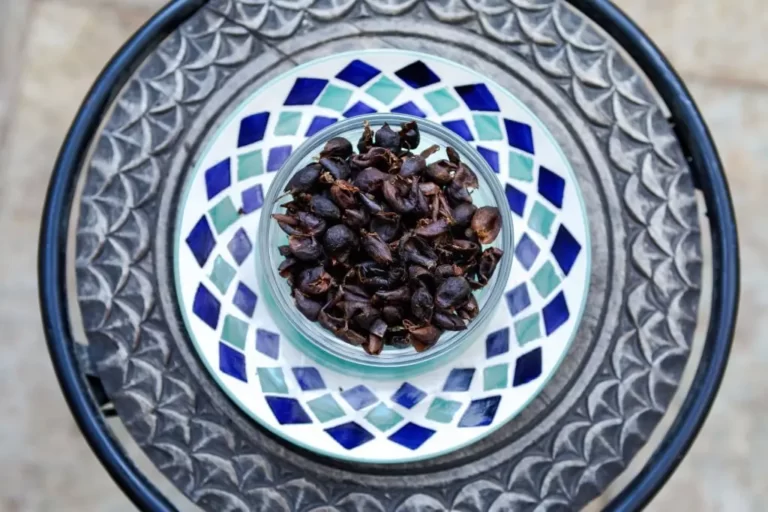Cascara has become a star of today’s coffee world by grabbing massive attention in recent years. A coffee lover must have seen it pop up on various coffee shops’ menus.
This mysterious ingredient is part of your dearly beloved coffee, but not exactly coffee at the same time.
If you are thinking about the coffee beans we adore, you are wrong. Cascara is the coffee cherry peel that protects our precious beans. The once discarded leftover is now a widely appreciated drink.
Allow me to introduce you to the most delicious leftover in the whole world.
What Is Cascara?
To understand cascara, you have to understand how coffee is produced. It all starts with a coffee plant. The plant gives us coffee cherries. The cherry holds seeds that we call coffee beans.
The fruits are processed for making coffee grounds. Processing separates the beans from the skin and flesh. The beans are then roasted and ground for a fresh brew.
Once, the skin of the beans was considered a by-product and thrown away. Some also used it as fuel for mills or as fertilizer for farming.

But today, we call these cherry skins “cascara.” Cascara means “shell” in Spanish. The outer skin is cleaned and sun-dried to make it consumable.
Cascara can make a broad range of heavenly delicious infusion drinks. Not all coffee farms produce cascara since it is a laborious process. Most cascara is produced in coffee-growing countries like Ethiopia, Yemen, and Bolivia.
Flavor Profile
Since cascara is a part of the coffee fruit, you might be imagining cascara having a taste similar to a cup of brewed coffee. But in reality, the difference between cascara coffee and bean coffee is massive.
If you’re one of those lucky ones who tasted ripe coffee cherries, you can guess. The taste of the cascara drink is pretty close to a coffee cherry, resembling a fruity taste.
The flavor of the cascara drink resembles that of herbal tea. The flavor profile has a wide range, from notes of vanilla, raisin, currants, orange, apricot, notes of rosehip, and many more.
Uses of Cascara
You can make Cascara tisane and syrup with cascara. The tisane is also called cascara tea. The tisane has a refreshing, tangy flavor and sweet taste. On the other hand, the use of cascara syrup has endless possibilities.
Cascara syrup can be used as a natural seasoning for different drinks. It makes a delightful base for cocktails or toppings for waffles, doughnuts, and pancakes. Also, you may enjoy it drizzled over a scoop of ice cream.
Cascara Simple Syrup Preparation
The preparation method for cascara syrup is straightforward to follow. You can make it at home with a few ingredients, The primary one being cascara (obviously). Secondly, you need a sweetener such as sugar, brown sugar, or honey.

Follow this recipe.
- Take ½ cup of cascara, 1 cup of sugar, and 1 cup of water.
- Mix everything and boil to a thick syrupy, runny honey-like consistency.
- Turn off the boiler and let the mixture cool down.
- Strain off the shells.
Voila! You have the simple cascara syrup ready to be served.
Having fun Nomies? You’ll love to read our piece on what is cold brew coffee.
Cascara Tisane Preparation
Cascara tisane tastes like herbal tea, having hibiscus, cider, and orange zest flavours. Though there is no exact recipe, the preparation method is similar to making tea. Therefore, some call it cascara tea or coffee cherry tea.

However, it is not authentic tea. Since teas originate from the species Camellia sinensis plant. And cascara comes from the coffee cherry, hence the name “coffee cherry tea.” Here’s the basic recipe.
- Use 2-3 tablespoons of cascara in hot water
- Steep times should be about 5-7 minutes
You can add honey or sugar for sweetness enhancement. Like regular tea, you can add an extra flavor of cinnamon, ginger, or nutmeg. Strain off the peel when it is done with a tea strainer. Cascara tea or tisane can be enjoyed both hot and cold.
Cascara Sagrada
Never confuse the cascara that comes from coffee fruit with cascara sagrada. Cascara sagrada is a part of the plant of the Rhamnus Purshiana species.
Cascara Sagrada can grow on the Pacific coast of North America, Costa Rica, and el Salvador.

A tea made using cascara sagrada is a bitter medicinal tonic. Its laxative property helps in bowel movement and treats constipation and gallstone.
But the cascara from coffee cherry peel does not possess laxative properties. Feel free to enjoy without having to worry about loose motions.
Caffeine Levels in Cascara
There is a myth that cascara is a highly caffeinated substance, even higher than coffee. In reality, the caffeine content of cascara is much lower, which is only 10–25% of the caffeine amount present in coffee beans.
In the most potent brew of cascara coffee, the amount of caffeine present in a cup is 111.4mg/L, whereas average coffee contains 400-800 mg/L.
International Market Of Cascara
Production and export of cascara started in Ethiopia and Yemen. The recent popularity of cascara in the international coffee market has motivated coffee farmers of South American countries, especially El Salvador and Bolivia, to produce and export cascara.
Aida Batlle, a relatively new, fifth-gen coffee producer from El Salvador, has recently started producing and exporting cascara.
An interesting fact: “cascara” is known as “Hashana” in Ethiopia and “Fisher” in Yemen. And in Yemen, cascara drinks are consumed more than coffee since it’s a cheaper alternative to coffee.
Had fun reading? Check out our piece on what are coffee cherries.
Bottom Line
So, that was all about cascara. Now you won’t feel as grossed out as before to try out leftover skins of fruit to use as a delicacy in your day-to-day life.
Would you give cascara a chance to be a member of your happy kitchen family?
FAQs
Cascara is the cleaned and sun-dried peel of coffee cherry fruit.
Cascara is used to make delicious cascara tea and cascara syrup.
We need ½ cup of cascara, 1 cup of sugar, and 1 cup of water. Everything is mixed and boiled to a runny honey-like consistency. Then take it off the flame and let it cool a bit. Strain off the shells and serve.
Cascara syrup is used as a natural seasoning for different hot and cold coffee beverages. It can be the base for cocktails or toppings for waffles, doughnuts, and pancakes. Also, cascara syrup is drizzled over a scoop of ice cream to enhance its flavor.
A cup of cascara tisane is prepared using 2-3 tablespoons of cascara in water. Then it is allowed to steep for about 5-7 minutes. You can add honey or sugar to enhance the natural sweetness. Just like regular tea, here too, you can add flavors of cinnamon, ginger, or nutmeg.
The caffeine content of cascara is much lower than a cup of coffee. That is only 10–25% of the caffeine present in coffee beans.

